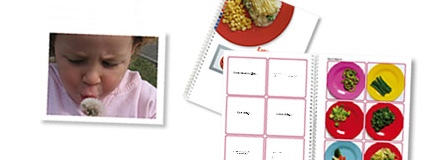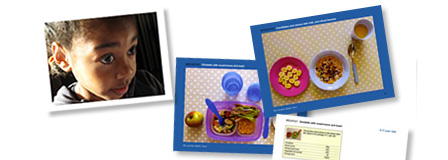 |
 |

 introduction to publications introduction to publications
|
 |
 |
|
 |
CHEW pictorial resources
Please note that these materials do not reflect any of the Scientific Advisory Committee on Nutrition (SACN) Revised Energy Reference Values from 2011.

The first year of life
Why does eating well matter in the first year of life?
Babies do amazing things in their first year of life. They grow, develop, learn to move and make sounds, their immune system develops and they move from breast milk as their sole source of nutrition to eating a mixed and varied diet.
Good nutrition really matters for babies: we want them to have all the nutrients they need, we want them to avoid anything which might do them harm (like too much salt or too much sugar) and we want to start them off on a lifetime of good food choices.
In the first 6 months of life babies need only their mother’s milk: this will provide all they need to grow and develop and stay well.
Breast milk is an amazing, free, environmentally friendly superfood, that is literally, priceless. Artificial infant formula milks will provide all the nutrients a baby needs, but these breast milk substitutes do not contain the unique substances found in breastmilk which protect babies from ill health now and when they are older.
At about 6 months of age babies need to start having some food to complement breastmilk, and by 7 months all babies should be eating a variety of foods at 3 meals a day. The sorts of foods – and the amounts of foods – that will give babies of 7 months to 1 year all the nutrients they need can be seen in our food photos. Please note that these materials do not reflect any changes since 2011.
Download PDF version

Children 1-4 years
Why does eating well matter for children 1-4 years?
Children do amazing things in the pre-school years. They grow, they develop, they learn to make a whole variety of big and small moves, they learn to talk, to reason, to imagine, to share and to play. Their immune systems are still developing and they need to eat a whole variety of foods to get all the nutrients they need to keep them healthy.
Children of this age need regular meals and snacks which are full of nutrients, and we also want them to avoid ingredients which might do them harm (like too much salt or too much sugar). We also want to encourage young children to enjoy their good food choices, learn about where food comes from, how to prepare food, cook simple dishes and share meal times with others.
Children in this age group should have three meals a day, and each meal should contain starchy foods for energy; meat, fish or alternatives to these foods which provide similar important nutrients like protein, iron and zinc; sources of calcium for healthy bones and fruits and vegetables for nutrients like vitamin A, vitamin C, folic acid and potassium.
Young children also need to eat mini-meals between their main meals to provide extra energy and nutrients.
The sorts of foods – and the amounts of foods to serve at meals and as snacks between meals – that will give children aged 1-4 years all the nutrients they need, can be seen in our food photos. Please note that these materials do not reflect any changes since 2011.
Download PDF version

Children 5-11 years
Why does eating well matter for children 5-11 years?
Children of primary school age are starting to gain independence, but they are still growing and have high energy needs to keep them going during their busy days. They will need to learn to concentrate at school, to read and write, listen and develop all the skills needed to be functioning members of their class, their family and the world around them.
Children of this age should be eating a whole range of different foods and have a clear understanding of where food comes from and why it matters that they eat well. They should be sharing meals with others and helping to choose their own meals and snacks.
We recommend that all children of this age have a school lunch provided by the school. School meals in the UK have to meet detailed nutritional standards that are hard to achieve with packed lunches. Eating together at school is also an important part of helping children develop good social skills.
Examples of the sorts of foods and the amounts of foods to serve in meals and snacks that will give children aged 5- 11 years all the nutrients they need can be seen in our food photos. Please note that these materials do not reflect any changes since 2011.
Download PDF version (5Mb)

Young people 12-18 years
Why does eating well matter for young people 12 - 18 years?
The teenage years mark the move from childhood to adulthood and during this time children will go through puberty, grow taller and develop the ability to become parents themselves. Good nutrition is critical in the teenage years yet many young people eat badly – making teenagers some of the most poorly nourished members of society.
High energy needs for activity and growth mean that teenagers need to eat a variety of foods, but changing lifestyles might mean they don’t want to eat in the traditional meal time patterns they had when they were younger.
Teenagers may also become much more independent in choosing the food they eat and it is important that they are given the skills to be able to budget and shop for food and cook for themselves and others.
It is important that teenagers understand that if they are poorly nourished this will impact on any children they have and that eating well, and being active, are part of being a healthy, successful adult.
The sorts of foods – and the amounts of foods – that will give teenagers all the nutrients they need eating a whole variety of different meal patterns can be seen in our food photos. Please note that these materials do not reflect any changes since 2011.
Download PDF version (5Mb)
|
 |

